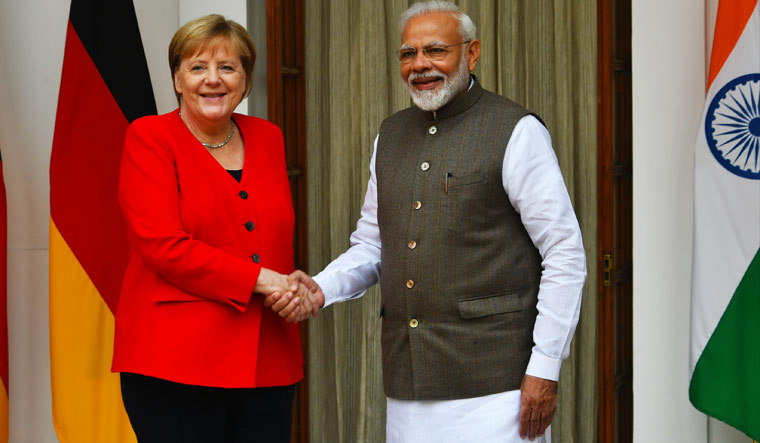On a day when the Environment Pollution Control Authority (EPCA) declared a public health emergency in Delhi following the thick smog that has shrouded the national capital since the morning after Diwali, and Delhi government declared that schools will be shut till November 5, India welcomed German Chancellor Angela Merkel's keenness to join the International Solar Alliance (ISA), “with a view to promote sustainable, climate friendly and energy efficient solutions internationally.''
Merkel is on a two-day visit to India. The official part of the visit was conducted on Friday, and the joint statement, issued after her meeting with Prime Minister Narendra Modi, is a positive document that looks at a future of shared co-operation in development, growth and international responsibilities.
Apart from climate change mitigation, green development and urban mobility, the two countries agreed to step up their partnership in other areas of development, including agriculture, transport and joint businesses. “Both leaders acknowledged the successful work under the German Indian Startup Exchange Programme on promoting the exchange between both startup ecosystems,'' the statement reads. Germany will also start a new German accelerator programme called 'Next Step India' for startups in India.
“Strong and effective multilateral co-operation is the key to secure peace, stability and prosperity. Major challenges of our time, by their nature and global scope, cannot be addressed by countries separately and must be tackled jointly,'' the two countries announced in a joint statement.
Co-operation in the field of artificial intelligence (AI) and digital transformation featured prominently in the talks, with the focus being the use of these technologies in the areas of health mobility, environment and agriculture management. AI collaboration in areas like precision farming to reduce waste of resources is an important area to be addressed in the future. “India and Germany highlighted the importance of a successful replenishment of the Green Climate Fund and encouraged developed countries and other countries in a position to do so to scale up their contributions...'' the statement read.
also read
- ‘Stone pelting, beheading of soldiers would have continued if Cong was in power: Modi
- Germany arrests two for allegedly spying for Russia
- ‘Everyone will regret it…’: PM Modi accuses opposition of spreading lies on electoral bonds
- Germany’s Scholz arrives in China on a visit marked by trade tensions, Ukraine conflict
- What the fish! Tejashwi Yadav's meal on helicopter snowballs into major political controversy
Germany also expressed readiness to provide additional concessional finance of one billion euro to India to support improvements in green urban mobility.
There is much complementarity in the goals of the two nations regarding non renewable energy targets—India hopes to provide 175 GW power from renewables by 2022 and Germany aims at meeting 80 per cent of its energy demands through renewables by 2050. Both leaders thus agreed to promote a climate friendly development of the Indian and German power markets.
They also welcomed the initiative to “closing the loop of marine litter in the ecosystem'' and signed two joint declarations of intent on marine litter.
The two sides have agreed to step up defence co operation, from manufacturing in India to focusing on global, regional, cyber and maritime security. A new mechanism for regular dialogue between the defence ministers was welcomed. The two sides stressed that no country should allow its territory to be used for launching terror attacks on other countries and enunciated the need for combined effort of all countries to fight terror. They reaffirmed their support for the continued full implementation of the Iran Nuclear Deal and noted that issues that have arisen around it should be resolved peacefully through political dialogue. They agreed that full compliance with the deal as well as the UN Security Council Resolution 2231 was needed to ensure regional and international peace and security.
They further reaffirmed their support to each other's candidature for a permanent seat in the United Nations Security Council.



